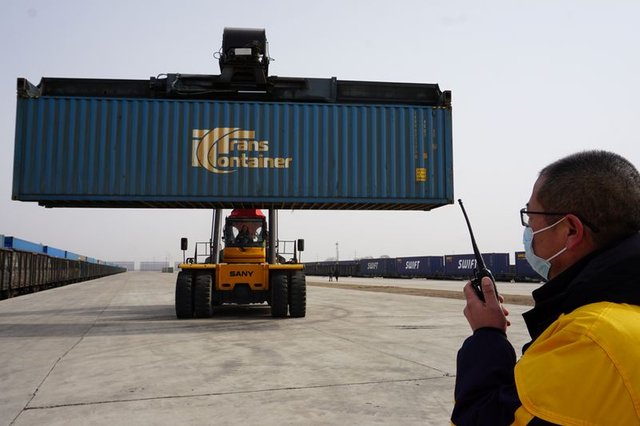China's central bank vows more steps to support virus-hit economy
Workers transport a container from a China-Europe freight train that departed from Russia's Omsk, at a cargo terminal in Ulanqab  Workers transport a container from a China-Europe freight train that departed from Russia's Omsk, at a cargo terminal in Ulanqab SHANGHAI/BEIJING (Reuters) - China's central bank will take further steps to support the virus-hit economy, including releasing more liquidity and lowering funding costs for firms, a vice governor of the bank told state media.
Workers transport a container from a China-Europe freight train that departed from Russia's Omsk, at a cargo terminal in Ulanqab SHANGHAI/BEIJING (Reuters) - China's central bank will take further steps to support the virus-hit economy, including releasing more liquidity and lowering funding costs for firms, a vice governor of the bank told state media.
The People's Bank of China (PBOC) will guide market interest rates lower and keep liquidity appropriately ample to help companies affected by the coronavirus epidemic, Liu Guoqiang, the bank official, told the Financial News in an interview.
The PBOC will release more liquidity to banks by adjusting the criteria for targeted reserve requirement ratios (RRR) cuts, Liu said.
"China's monetary policy space is still very sufficient, and the toolbox is also sufficient. We are confident and able to offset the impact of the epidemic," Liu told the newspaper.
The central bank will push down real lending rates, especially for small firms, by further improving the transmission mechanism of the loan prime rate (LPR) - its new benchmark lending rate, Liu said.
Liu reiterated that the central bank will not resort to "flood-like" stimulus.
China has cut several of its key rates in recent weeks, including the benchmark lending rate on Thursday, in a bid to reduce financial strains on companies facing severe business disruptions due to the outbreak. Investors widely expect further monetary and fiscal support measures in coming weeks.
Benchmark deposit rates will also be adjusted at an appropriate time, Liu said.
Liu said that the epidemic's impact on China's economy would be limited, and that Beijing would strive to meet economic and social development targets this year.
Chen Yulu, another vice central bank governor, said that the coronavirus' impact on China's economy will be short-term and limited, and that the country is fully confident it beat the epidemic, state media reported on Saturday.
"We believe that after this epidemic is over, pent-up demand for consumption and investment will be fully released, and China's economy will rebound swiftly," Chen said.
China's economic growth may show a sharp slowdown in the first quarter, probably dipping to 3% or even lower from 6% in the previous quarter - which was the weakest pace in nearly 30 years, economists estimated.
The central bank also is closely monitoring consumer prices, which could be disturbed by the virus epidemic, Liu said.
Seasonal factors and the virus' impact were behind the flat M1 money supply, or cash in circulation plus corporate demand deposits, in January from a year earlier, Liu said.
Liu also said China's economic fundamentals were sound, adding it had ample foreign currency reserves to support its yuan currency.